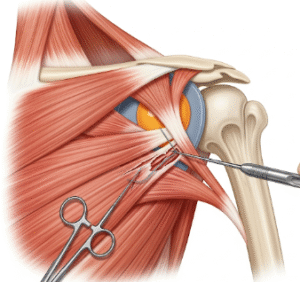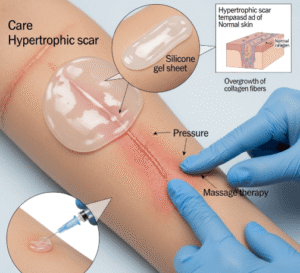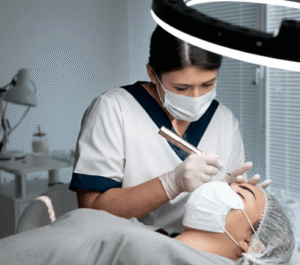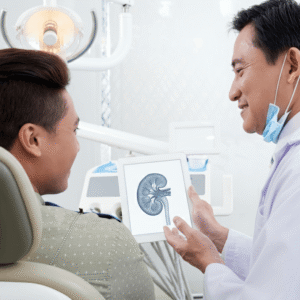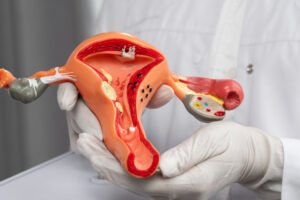Overview
Pelvic Congestion Syndrome (PCS) is a chronic condition caused by varicose veins in the pelvis. It primarily affects women, especially those who have had multiple pregnancies, and is a common but underdiagnosed source of chronic pelvic pain. The condition occurs when veins in the pelvic region become enlarged and fail to circulate blood properly, leading to pressure and discomfort.
What is Pelvic Congestion Syndrome?
Pelvic Congestion Syndrome is similar to varicose veins in the legs but occurs deep within the pelvis, around the uterus, ovaries, and vulva. The veins become dilated due to valve failure, allowing blood to pool and cause a feeling of heaviness, aching, or throbbing pain.
The pain typically worsens after long periods of standing, during menstruation, or following intercourse. PCS is more prevalent in women of childbearing age and can often be misdiagnosed due to overlapping symptoms with other gynecological conditions.
Symptoms
Common signs and symptoms of PCS include:
- Chronic pelvic pain lasting more than six months
- Dull, aching pain that worsens with standing, walking, or at the end of the day
- Pain during or after intercourse (dyspareunia)
- Worsening pain during menstruation
- Visible varicose veins on the vulva, buttocks, or upper thighs
- Increased urinary frequency or urgency
- Lower back pain
- Fatigue and heaviness in the pelvis
Causes
The main cause of PCS is venous insufficiency in the pelvic region. Veins have one-way valves that keep blood flowing toward the heart. When these valves fail, blood flows backward and pools in the vein, causing congestion and pain.
Factors that contribute to this include:
- Multiple pregnancies (increased pelvic pressure and hormonal changes)
- Hormonal influences, particularly estrogen which weakens vein walls
- Compression of pelvic veins by surrounding structures (e.g., May-Thurner syndrome)
- Congenital vascular abnormalities
Risk Factors
Several conditions and factors increase the likelihood of developing PCS:
- Women aged 20–45, especially those who have had multiple children
- Family history of varicose veins or vein disorders
- Hormonal imbalances
- Obesity
- Prolonged standing or sitting
- Pelvic surgeries or injuries
- History of ovarian or uterine vein enlargement
Complications
While PCS is not life-threatening, it can significantly reduce quality of life and cause:
- Chronic pain
- Emotional stress and anxiety
- Disruption of sexual activity
- Reduced mobility and productivity
- Possible infertility (in rare cases)
- Worsening of varicose veins in the legs or vulva
Prevention
There’s no guaranteed way to prevent PCS, but these strategies can help reduce the risk or manage early symptoms:
- Maintain a healthy weight
- Avoid prolonged standing or sitting
- Use compression garments to improve venous return
- Stay physically active
- Manage hormone levels
- Early evaluation of pelvic pain to avoid misdiagnosis
Treatment Options in Korea
South Korea is known for its advanced vascular treatment technologies, minimally invasive interventions, and multidisciplinary approach to women’s health. Pelvic Congestion Syndrome can be diagnosed and effectively treated at leading Korean medical centers.
1. Diagnosis
- Pelvic ultrasound (transvaginal and Doppler)
- CT scan or MRI to identify varicose veins
- Pelvic venography – the gold standard for diagnosis
- Laparoscopy (in some complex cases)
2. Conservative Treatment
- Pain management with NSAIDs or hormonal therapies (e.g., medroxyprogesterone)
- Lifestyle modifications like weight loss and exercise
- Compression garments
3. Minimally Invasive Treatment
- Ovarian vein embolization (OVE) – a common and highly effective procedure offered in Korea. It involves inserting a catheter and injecting a solution to block the faulty veins.
- Sclerotherapy – uses a special solution to shrink or close off damaged veins.
- Endovenous laser or radiofrequency ablation – newer methods for vein closure.
4. Surgical Options (rarely needed)
- Laparoscopic ligation of pelvic veins
- Hysterectomy or oophorectomy, only in extreme and nonresponsive cases
5. Follow-up and Support
- Regular follow-ups with vascular surgeons or interventional radiologists
- Counseling and support for managing chronic pain
- Multidisciplinary care involving gynecology and pain specialists
Top hospitals in Korea such as Seoul National University Hospital, Asan Medical Center, and Samsung Medical Center offer world-class diagnostics and interventional treatments for PCS.


